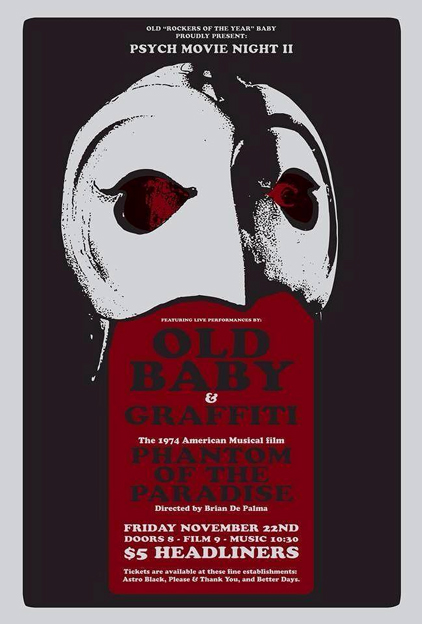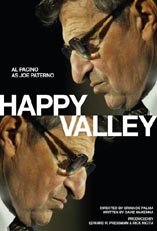AND ELIZABETH OLSEN CALLS DE PALMA'S 'CARRIE' GROUNDBREAKING
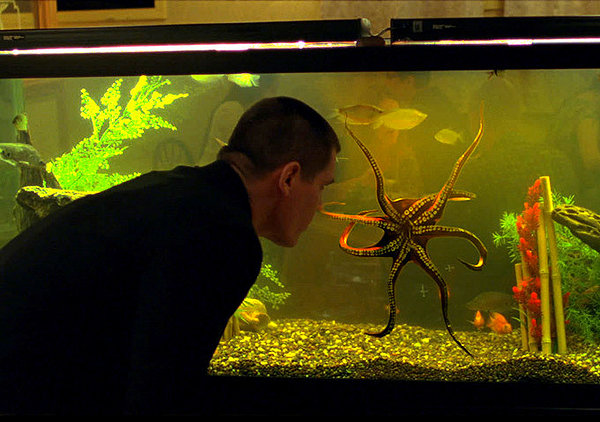
Matt Zoller Seitz, editor-in-chief at RogerEbert.com, posted a positive review yesterday of Spike Lee's Oldboy, which is a remake (or reimagining) of Park Chan-Wook's film from ten years ago. As Seitz points out in the excerpt below, both are adapted from a Japanese graphic novel. Discussing Lee's direction of the material, Seitz mentions Brian De Palma a couple of times:
It's worth pointing out here that Park's film is not an original story, but an adaptation of a Japanese comic book of the same name. Both versions find ways to visually suggest that you're reading a big-screen graphic novel with pages that come to life. The compositions in Lee's movie have such a painterly or "illustrated" quality that they might as well have thick black lines marking off the edges of the frame. At no point does the film try to be "realistic," except when it comes to the strong, simple emotions that its characters feel. Lee's "Oldboy," like Park's, obeys its own illogical logic (a hotel room hallucination starring Lee's brother Cinque has the goofy randomness of a joke in a David Lynch movie). The whole thing flows as dreams flow, linking situations to other situations and images to other images in a seemingly free-associative manner.
At its wooziest, Lee's direction reminded me of Brian DePalma or John Carpenter in nightmare reverie mode, or Alfred Hitchcock when he seemed possessed by whatever horrible muses drove him. It's purely intuitive, at times musical, direction. The lack of a political dimension seems to have freed Lee to be looser and more (cruelly) playful than usual. There's news footage on Joe's hotel room TV, but when we see, for instance, scenes from 9/11 or the Iraq war, it's not meant to drive home anything but the passage of time and its effect on Joe's psyche. The performances are all over the map, in what struck me as a DePalma-like way. Some actors give fairly naturalistic performances (Brolin and Olsen) while others (Jackson and Copley) chew the scenery into fine shreds and then pluck them from their shiny teeth. Lee presides over the madness with a droll serenity that says, "This is the movie; deal with it."
The big problem with Lee's "Oldboy" is that for all its dark confidence, it doesn't reimagine the original boldly enough. This isn't like Martin Scorsese's "Cape Fear," David Cronenberg's "The Fly" or Jonathan Demme's "The Manchurian Candidate"—or the recent superhero-inflected version of "Carrie," which I liked better than most critics—all of which drastically rethought their inspirations. Lee's "Oldboy," in contrast, is more like "Point of No Return," the American remake of "La Femme Nikita." It's so close to its predecessor in so many ways that I can't see much reason for it to exist, except to give xenophobic viewers an experience similar to the original, but minus the subtitled Korean and the octopus-eating scene—and with a more ostentatiously cartoonish bad guy, and lot more monologuing to explain the convoluted plot.
That's not a bad thing, though, when you consider the current climate for mainstream American films. For people who haven't seen the original "Oldboy" or anything like it, this will be a rare studio release that feels shocking and abrasive and perverse and in some way new. I'd love to sit through Lee's movie again in a theater with newbies who came to see a straightforward revenge picture starring a guy who's been locked up for a long time and have no idea what they're actually in for: a swan-dive into the toxic id. Few American auteurs are making mainstream studio movies in the vein of Spike Lee's "Oldboy": unabashedly hardcore genre pictures that aren't afraid to treat sex and violence as colors on a palette, and get nasty and raw, in that seventies-movie way. Park's "Oldboy" was no skip through the daisy field, but this one is even harder to watch, sometimes indulging in savagery that blurs the line between Old Testament morality play and straight-up exploitation.The filmmakers seem obsessed with making everything as extreme as possible, replacing, for example, a bruising bit of hammer torture with a prolonged sequence in which the hero uses an X-acto knife to slice a dotted-line-shaped pattern into a former jailer's throat.
Roger Ebert's four-star review of the original praised it as "the kind of movie that can no longer easily be made in the United States" thanks to content restrictions imposed by "a puritanical minority." The same sentiments apply here, but even more so, because Park's film came out ten years ago, and things have only gotten more restrictive since then. Plenty of international filmmakers are working in this mode—Park, Takashi Miike, Nicolas Winding Refn and Lars von Trier spring immediately to mind—but not too many English-language directors, aside from Quentin Tarantino and sometimes Oliver Stone ("Savages"). Martin Scorsese and David Cronenberg used to make this sort of picture all the time, but haven't in a while, perhaps because it's just too much for some people, and "just too much" movies tend not to get made at a major studio level because the financial stakes are too grave. I don't like or approve of everything in "Oldboy," but I'm glad it exists. The multiplexes are filled with PG-13 movies that should have been R-rated movies, released by studios that don't make adults-only genre films anymore. This is one such film, starring a real actor, directed by a real director. It deserves to be seen and argued about.
ELIZABETH OLSEN DISCUSSES DARK FILMS, AND 'CARRIE'
Meanwhile, Oldboy actress Elizabeth Olsen talked to Danny Peary at the San Harbor Express, telling him that she wasn't offered a role in the film, but once she read the script and then watched the original movie, she "tried to get the job," and got it. Discussing movies with dark themes, Olsen tells Peary, "I think there’s something about the brutality and the violence in Oldboy that’s imaginative. It’s bizarre and weird and a little heightened from reality. No one’s shooting at each other and there’s nothing about it that would remind you of what you see on the news."
Peary then asks Olsen, "What is it that makes some dark films fail while others become classics?"
Olsen replies, "I think it has to do with it being something new. You can remake Carrie, for instance, but the reason why [Brian de Palma's] Carrie was Carrie was because it was groundbreaking. It could still be a great new story to tell people who haven’t seen it, with great actors and actresses, but the reason the original was a classic was because there was nothing like it before."
Updated: Thursday, November 28, 2013 2:40 AM CST
Post Comment | View Comments (1) | Permalink | Share This Post




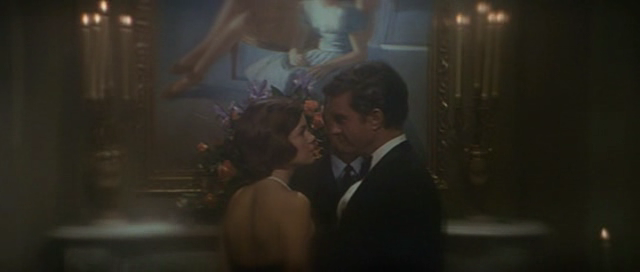
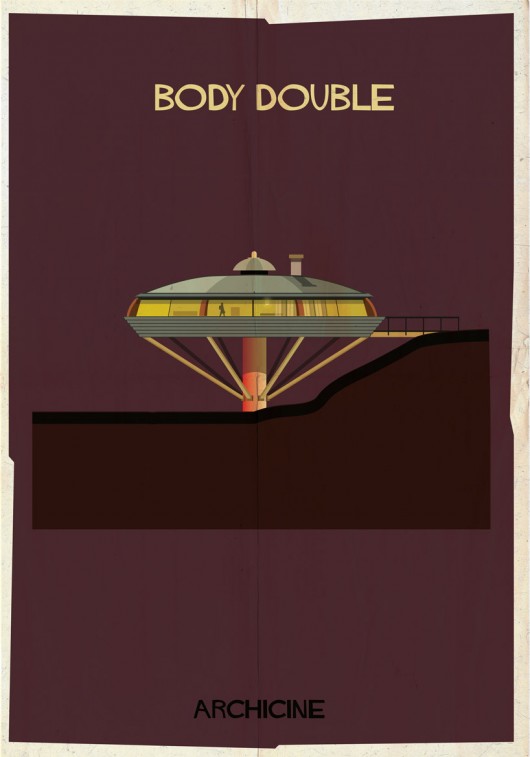

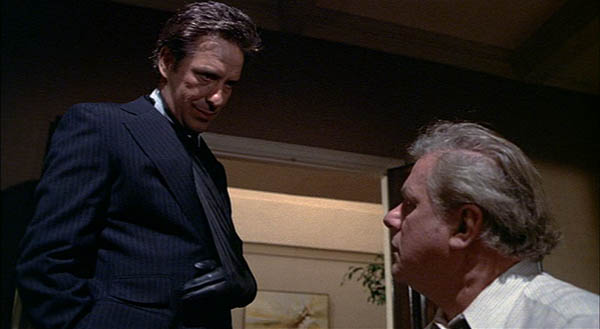
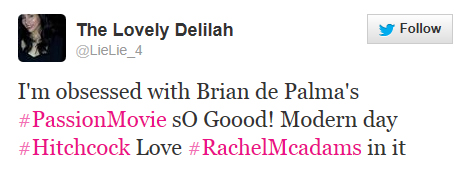
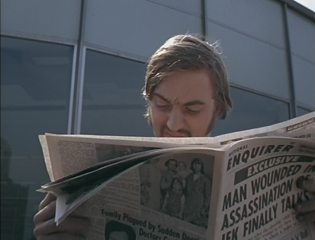 Friday marks the 50th anniversary of the JFK assassination. There has been a proliferation of TV specials, magazines, and online articles looking back and examining that weekend of shocking events and images in November 1963. And tonight,
Friday marks the 50th anniversary of the JFK assassination. There has been a proliferation of TV specials, magazines, and online articles looking back and examining that weekend of shocking events and images in November 1963. And tonight,  Emily Mortimer, who has already been cast as the lead in Brian De Palma's upcoming
Emily Mortimer, who has already been cast as the lead in Brian De Palma's upcoming 